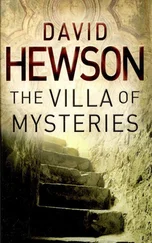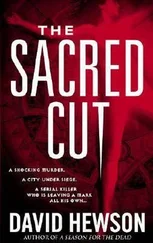“I pay for everything,” Randazzo replied, trying not to sound drunk. “Including scum like you.”
They were coming into focus now. There were three of them. One older, bigger than the rest. Randazzo took a good look around the empty square.
“Lavazzi! Malipiero!” he yelled. “Where the hell are you when you’re wanted?”
“Language, language,” the big one tut-tutted under his breath.
“Where the fu . . .”
Randazzo cut what he was about to say and looked inside the restaurant. There was no one there now. Not even the insolent little waiter. The piazza was silent and empty, not a face at any of the windows, not a hand pushing out ribbons of washing onto the ropes that were strung across the adjoining alleyways, one wall to the other. Nothing but him, the men and some old stone lions.
He sniffed the air. There was a stink here, rising up from the water lapping in the canal by the Arsenale gates, reaching him on the slightest of August breezes.
The big one got up, brushed crumbs off his trousers, then took a final gulp of his beer. “You know,” he said, “I don’t think there’s anything worse than that. A man of the Church using profanities. Feeding his face with good, rich food when half the world’s starving.” He glared at Randazzo, then nodded back at the restaurant. “Back where we come from, people dream about eating somewhere like this. Even the priests.”
But I’m not a priest, Randazzo wanted to object. Something, some note of alarm sounding in the Barolo fuzz that filled his brain, stopped him.
The other two were up on their feet now, one of them with something to say.
“You know what’s worse than a greedy priest?” he asked.
Randazzo yelled for Lavazzi and Malipiero again, swore he’d kick their asses when they finally dragged themselves out of whatever fleapit they’d found.
“What’s worse,” the Croatian continued, coming close to him with a look on his face that was more disappointment than threat, “is a crooked cop. One who takes what’s on offer and still doesn’t know his place.”
“A lack of gratitude,” said the big one, taking something out of his pocket, something black and dull and familiar, screwing an object onto its nose with a casual disdain that made Gianfranco Randazzo start to shiver inside the hot, itchy Franciscan habit, “is tantamount to a lack of respect.”
The Croatian stood in front of Randazzo now, the gun with its silencer firm in his right hand. “And that, Commissario,” he added, “is why I’ve decided this doesn’t happen easy.”
Randazzo’s head cleared in an instant; every last confusing speck of the heavy bloodred booze fled somewhere deep inside his bloodstream.
“I di-didn’t talk to anyone,” he stuttered. “I wouldn’t talk to anyone. Tell him. Tell them all. I . . .”
They weren’t even listening. They were just scanning the piazza, making certain they were alone.
“I’ll be sure to pass that on,” the big one said, then pressed the pistol hard on Randazzo’s right knee, just as the policeman was coming off the seat, trying to summon the strength and the courage to run. There was a compressed, powerful retort, like the popping of a balloon inside a pillowcase.
Gianfranco Randazzo lifted his shattered leg and, still convinced he was able to run, screamed when his foot hit the ground, felt himself falling, felt something stab through his chest and his gut, small hot metal devils whirling through him, cutting and slicing, fiery chunks of metal scorching through his flesh.
The paved piazza rose up to meet him. His head banged hard on the cobbles, his teeth smashed on the hard, hard stone.
He looked up, trying to see them. Above him stood the stone lion, leering, a stolen object happy to watch something else being robbed from a man.
Then its worn features disappeared, were replaced by the face of the big Croatian. An unseen object, hard, cold, metallic, came from nowhere and placed itself on a pulsing vein in Randazzo’s right temple.
“Ciao,” the man murmured.

SCACCHI’S BOAT WAS STILL ABSENT WHEN THEY’D CIRCLED the island. Apart from the woman, anxiously scanning the sky, looking for the source of the noise, Costa knew he had nothing to go on. Nothing except an illicit little shack, erected somewhere at the back of Piero Scacchi’s property, and recently, from what he’d seen from the passenger seat of Andrea Correr’s plane. It was a shot in the dark. Just the kind of trick Leo Falcone would have pulled when things were getting difficult. Costa hoped a little of the old bastard’s luck had rubbed off.
He walked up from the beach, climbed over a low rickety fence and found himself in a field. Immaculate rows of pepper plants, dotted with red fruit, stretched in front of him, verdant on raised beds. Beyond a fence to the left lay similar ranks of purple artichokes, and to the right a field of equally proper spinach beet, a vivid sheet of green. Scacchi, or whoever tended these crops, was careful. Not a plant was out of place, not a leaf showed a sign of disease or insect damage. Nic recalled the way his own father had worked the vegetable garden outside the family house back in Rome, on the outskirts of the city, close to the old Appian Way. There had been the same peasant skill, the same monotonous, backbreaking care there, and it showed in the crops, in every shining leaf.
He looked ahead, towards the shack, now no more than a hundred metres away. The woman was gone. Back inside perhaps. Or fleeing to find help, suspecting what was on the way. Costa thought about what he knew of the background of the case, took out his service pistol, looked at it, checked the magazine, then put it back in the holster hidden beneath his dark jacket.
Guns depressed him. They always had, and, he suspected, always would.
Then he took out his mobile phone and checked for messages. There were none. Not a word from Teresa or Peroni. Or Emily either, and he wondered why he’d thought of her last.
Casting these misgivings to one side, or trying to, he walked on to the little house, found the door open, went in, and said, quietly, calmly, with not a hint of threat in his voice, “Signora Conti?”
The place wasn’t what he expected. From the outside it seemed a run-down rural hovel, plain white walls, poorly built, with a single small window giving out onto the tiny patch of garden, nasturtiums and roses, that sat in front of the cheap green single door. But from within, it looked like a home, and not that of a peasant farmer either. There were paintings on the walls, only dimly visible in the poor light, a hi-fi system playing classical music at low volume, and shelves of books. The smell of food drifted in from an adjoining open door. The place was spotless, tidy and organised in a way which seemed, to him, more urban than rural.
“Signora Conti?” he called again. “I wish to talk with you. There’s nothing to fear.”
The woman came out of the kitchen, wiping her hands with a cloth, glowering at him. She had short light brown hair, an attractive, intelligent face, and eyes that kept darting around the room, in any direction but his.
“Who are you?” she demanded. “What right do you have to walk in here? Flying your plane over my house . . . ?”
“Signora Conti—”
“Stop saying this name!” she insisted, voice rising. “There’s no such person here. Go, please. Before I call the police.”
He took out the photo from his pocket. They had just one in the files in the Questura. It was old. She’d changed her appearance. Dyed her hair, cut it short.
Читать дальше













